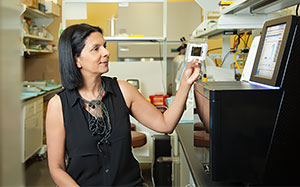
Health and Medicine Rocks SXSW
Biology and Biochemistry’s Gunaratne Part of SXSW Personalized Medicine Panel
When people see the initials SXSW, most think of Austin and music.
 However, since its start in 1987, the South by Southwest Music Conference and Festival (SXSW) has grown, adding new topics including film and interactive technology. This year, the Health and MedTech Expo made its debut, reflecting the growing importance of technology and innovation in improving health care.
However, since its start in 1987, the South by Southwest Music Conference and Festival (SXSW) has grown, adding new topics including film and interactive technology. This year, the Health and MedTech Expo made its debut, reflecting the growing importance of technology and innovation in improving health care.
Preethi Gunaratne, associate professor of biology and biochemistry, served on the panel, “Personalized, Predictive Outcomes Empower Patients.” The group examined next-generation high-tech and high-touch approaches to empower clinicians and patients to explore the outcomes of similar patients for supporting more informed treatment decisions.
 Gunaratne discussed the impact of advances in genome sequencing technologies to unravel the genetic blueprints underlying complex diseases such as cancer. She highlighted findings from The Cancer Genome Atlas (TCGA) project and her contributions to the TCGA consortium on elucidating the role of small noncoding RNAs called microRNAs.
Gunaratne discussed the impact of advances in genome sequencing technologies to unravel the genetic blueprints underlying complex diseases such as cancer. She highlighted findings from The Cancer Genome Atlas (TCGA) project and her contributions to the TCGA consortium on elucidating the role of small noncoding RNAs called microRNAs.
“We anticipate that, in the near future, all patients who present with cancer will have their tumors subjected to whole genome sequencing. The genomic portrait of each patient’s tumor will be used as a framework for practicing precision medicine,” she said.
Gunaratne added that “based on the specific mutations that characterize each individual’s tumor, scientists working in this field will be able to develop tools to predict clinical outcomes, such as life expectancy, as well as whether a patient will respond to conventional therapies, such as chemotherapy and radiation. Most exciting are the newly emerging targeted therapies that can be used to specifically attack oncogenic mutant genes and pathways that drive cancer in each patient which are the cornerstone of the Precision Medicine Initiative.”
Joining Gunaratne on panel were Jay Piccirillo, director of the Clinical Outcomes Research Office at the Washington University School of Medicine; Claudia Williams, senior advisor for health technology and innovation for the Office of Science and Technology Policy at the White House; and Robert Palmer, CEO and founder of PotentiaMED.